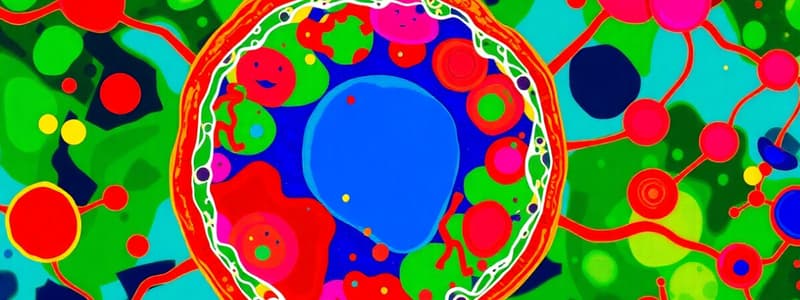Podcast
Questions and Answers
What is the primary role of enzymes in biological systems?
What is the primary role of enzymes in biological systems?
- To transport substances across membranes
- To provide structural support to cells
- To store genetic information
- To catalyze and accelerate chemical reactions (correct)
What is the monomer of nucleic acids?
What is the monomer of nucleic acids?
- Amino acids
- Nucleotides (correct)
- Fatty acids
- Simple sugars
Which of the following best describes a controlled experiment?
Which of the following best describes a controlled experiment?
- An experiment that tests multiple independent variables simultaneously
- An experiment that lacks any variables
- An experiment that does not use any control group
- An experiment where only one variable is changed while all others are kept constant (correct)
What characterizes prokaryotic cells that distinguishes them from eukaryotic cells?
What characterizes prokaryotic cells that distinguishes them from eukaryotic cells?
What happens to an enzyme when it denatures?
What happens to an enzyme when it denatures?
Flashcards
What is a controlled experiment?
What is a controlled experiment?
A controlled experiment is a scientific test where only one variable is changed at a time, with all other factors kept constant. This helps researchers isolate the effect of the manipulated variable and determine its impact on the outcome.
What is an independent variable?
What is an independent variable?
The independent variable is the factor that is intentionally changed or manipulated by the experimenter in a controlled experiment. It's the cause you're testing to see if it has an effect.
What is a dependent variable?
What is a dependent variable?
The dependent variable is the factor that is measured or observed in a controlled experiment. It's the effect that is expected to be influenced by the independent variable.
What is the purpose of a control group?
What is the purpose of a control group?
Signup and view all the flashcards
How do enzymes catalyze, or speed up chemical reactions?
How do enzymes catalyze, or speed up chemical reactions?
Signup and view all the flashcards
Study Notes
Biology Final Study Guide
- Characteristics of Life:
- Seven characteristics of life
- Brief description for each characteristic
- Levels of biological organization (smallest to largest)
- Experimental Design:
- Defining a controlled experiment
- Independent variable
- Dependent variable
- Claims, Evidence, and Reasoning:
- Define and give examples of claims, evidence, and reasoning
- Macromolecules:
- Eight macromolecules
- Monomer for each macromolecule
- Functions of each macromolecule in the body
- Elements in all macromolecules
- Enzymes:
- How enzymes catalyze reactions
- Graph of enzyme activity with temperature
- Definition of enzyme denaturation
- Cell Structure and Function:
- Comparing prokaryotic and eukaryotic cells
- Labeling parts of plant or animal cells
Studying That Suits You
Use AI to generate personalized quizzes and flashcards to suit your learning preferences.



